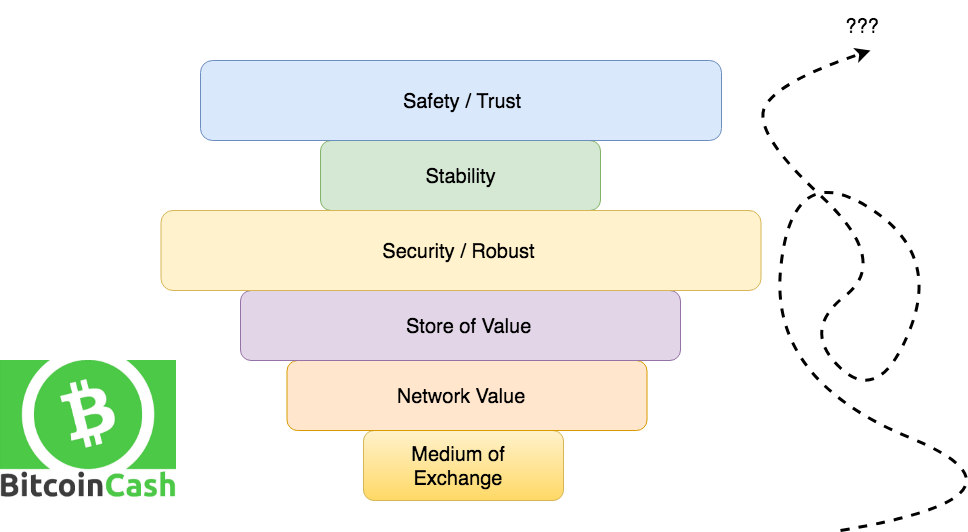Latest news about Bitcoin and all cryptocurrencies. Your daily crypto news habit.
The Definitive Guide. Case closed. Lets move on. Plz
Here goes…
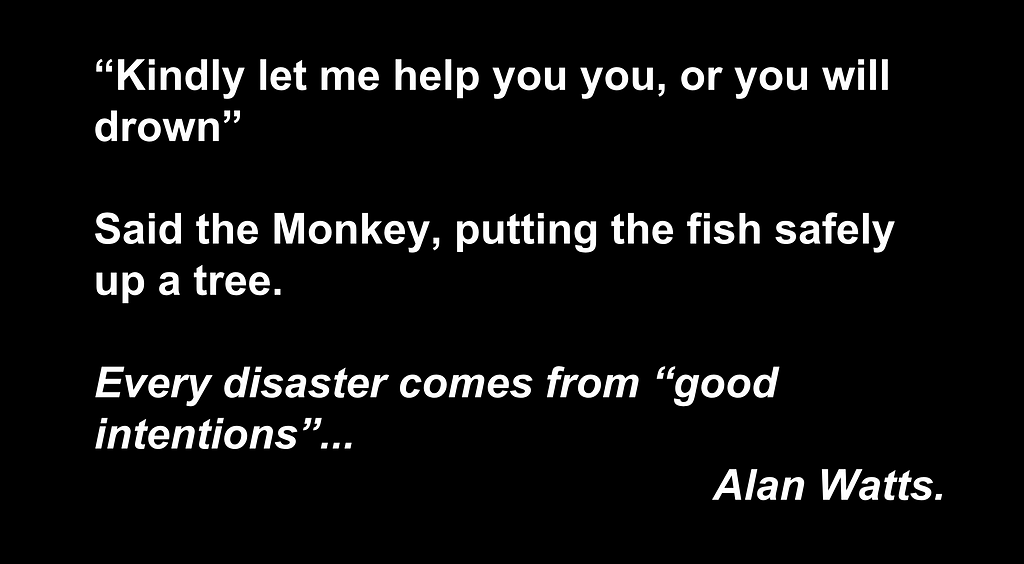 Keep this quote in mind…it will make more sense as we progress…
Keep this quote in mind…it will make more sense as we progress…
Disclaimer !!!
My intent is not to offend anyone during this post, but because I know it’s inevitable, and people will always be subject to their emotions, I’ve decided to not really care if you get offended — and just say what needs to be said.
Please also note; I didn’t want to get dragged further into this shit storm, but after some recent disagreements with people in the BCH camp, I felt it necessary to put on ‘paper’ my thoughts, my research and the conclusions subsequently brought forth.
What follows is going to be an “as factual as possible” account of what I’ve found and my thesis on WHY it’s so important to follow through with a particular methodology for a particular use case.
For those of you who’d like to know, or question it; YES, I’ve done research on both sides of the equation.
I will link at the end of the article as many references and people whom I remember and believe know what they’re talking about in the space, but as a quick overview, I can tell you I’ve studied, read & watched thousands of articles and videos from a very, very broad selection of incredibly intelligent humans, including (but not limited to) Andreas M. Antonopoulos, Jimmy Song, Trace Mayer, Wences Casares, Naval Ravikant, Chamath Palihapitiya, Vitalik Buterin, Simon Dixon, Adam Back, Kyle Samani, Mike Hearn, and many many more, not to mention the original white paper and the god-knows-how-many interpretations of it.
Please note; The case I’m going to make is not for or against Bitcoin or BCH per-se.
It’s for the methodology / strategy I believe is most important for this experiment to succeed and change the world.
And in making that case, I’ve reinforced my beleifs, and I think you’ll be able to see the writing on the wall with respect to which option is long term viable.
Disclaimer Part 2!!
(you can tell this was written in parts…lol)
I was originally going to call this post “An open Letter to Roger & all BCH fanatics”, but in the process of doing some research, I realised a few things (assuming we remove all the conspiracy theory shit):
- We all want the same thing (mostly)
- We have different theories / ways of going about it
- It’s a passionate subject, hence everyone gets extra emotional, makes it about “us” vs “them”, and makes it look crazier than it all is
- Bitcoin is complex, and because nobody “truly” understands it, the problems get compounded
- The disparity is not about big blocks or small blocks — it’s actually about people’s definition of “what” Bitcoin is (or should be) and why.
And that last point is important, because that’s where the real contention lies.
I realised that the ONLY way to get to some resolution here is to agree that:
- This whole discussion should not be about what “was”, or how people feel about each other, but:
- It should be about what strategy gives BTC the greatest chance for success
So…in light of all that;
I dialed back the language, removed much of my bias, and spent some extra time reviewing ALOT of content that I don’t generally subscribe to, from people whom I don’t necessarily agree with, and who’s opinion I would usually just ignore, just so I can present a logical case in the BEST way possible.
The conclusions I’ve come to….are below..and because this is going to be a long article, I’m going to split it up into a 3 or 4 part series.
Enjoy..
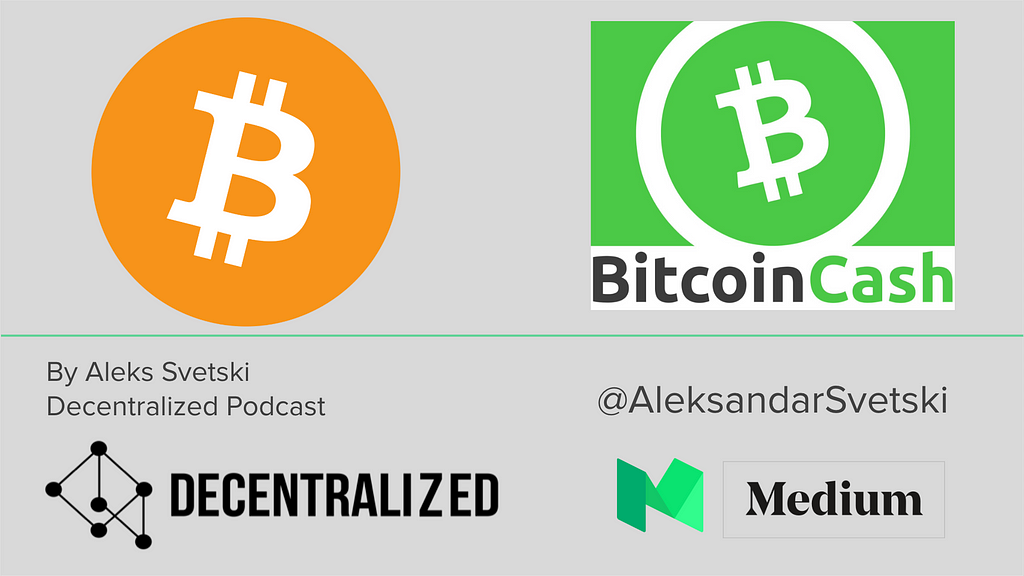 Yeah that’s me…and my beautifully designed slide…lol
Yeah that’s me…and my beautifully designed slide…lol
Part 1: Foundations
Why did Bitcoin work in the first place?
I don’t think many people even understand or realise why Bitcoin worked / or has worked thus far. I’ll try clear this up:
Bitcoin is a fluke. It’s a freak of nature accident that’s had a global impact and will change the course of histroy for all of us.
It was a technological marvel (and mostly still is), but it did NOT work because “blockchains” are some amazing innovation, nor did it work because it has some “magic economic formula” of 21 million coins, digitally divisible to 10 decimal places, with a 4yr half life on mining rewards, etc.
It worked for 3 primary reasons:
- Satoshi disappeared once it had gained enough initial traction / level of ‘decentralization’
- Game Theory / The Selfish Gene (inherent in all humans & ecosystems)
- Network effects. It was allowed to grow mostly un-inhibited until it was too entrenched to quash.
This means there was no “head of the snake”, to cut off. This means that the very “gene” or bio-make up of the humans who participate in the propagation of this network are incentivized them to protect, grow & secure it in the pursuit of their own self interest.
This means that the effort people put into it, since the beginning has created a level of “vesting” in the community that’s unprecedented. This means NOBODY saw this coming, ie; it was a surprise attack, and as a result, this means that it’s become so entrenched in the ecosystem and broader consciousness that if it’s most probably not going anywhere.
Apart from these 3 key elements, there are a number other factors that made this freak accident succeed so far:
- The timing of when it was launched (2008/2009)
- The kind of people who initially supported it
- It was a 0 to 1 innovation at the time
- It’s become the reserve currency for the space
- All the infrastructure has been built around it
- It’s the most trusted network, and the players who actually count, all have their funds held in it.
The timing and miso-mash ‘soup’ of factors that Bitcoin and it’s history have been, mean that if we tried to “re-do” this experiment, it’s not going to work in the same way.
Decentralizatin & Censorship Resistance
Bitcoin Exists for 2 reasons
As a result of the weird concoction, of all of the above factors, we have something that is:
- Digital
- Divisible
- Mathematically secure
- Surpassed a critical mass
- Neutral (in just about every way, ie; politically, racially, status, etc)
- Decentralized (on more levels, AND, more than than anything else)
And therefore provides:
- Censorship Resistance, and
- Sovereign Ownership
Of a Bearer Asset, which can represent a value, for anyone, anywhere, at anytime.
VALUE
(Remember this word.)
Bitcoin’s use as a censorship resistant bearer asset is it’s most important use case, and off the back of this statement, I’m going to explore how best to approach making sure those things remain key & core.
If you disagree with that statement, now would be a good time for you to review what happened to the last non-governemnt issued / mandated currency to be issued, that was not those two things:
Now, lets break this argument down.
2 Strategies. One is Superior
Taking out all of the conspiracy theories, and looking at facts, the following comparison table is how I think the 2 strategies can be summed up.
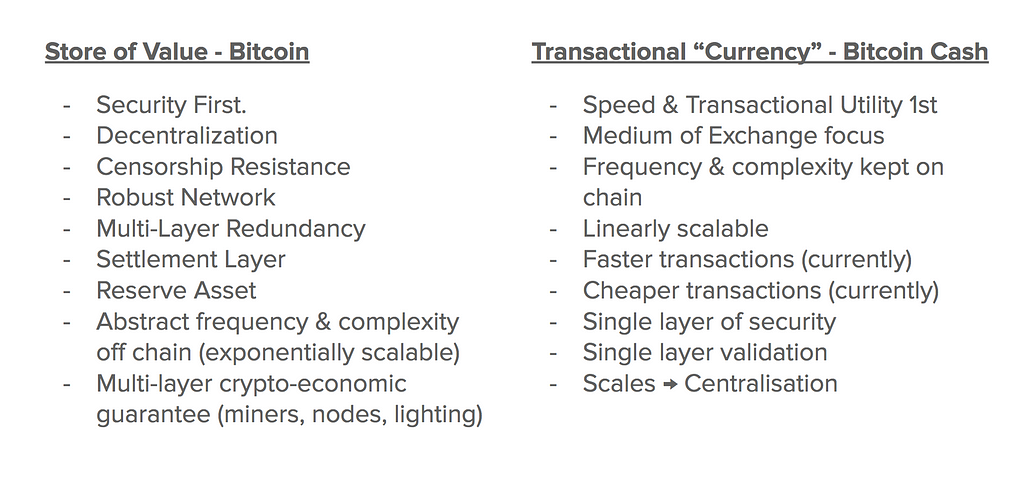 Slide from my presentation @ BTC vs BCH Brisbane
Slide from my presentation @ BTC vs BCH Brisbane
Of note is the “order” of how things should happen, which I is far better depicted by this image than words:
 The red line is not investment advice…but remains my hypothesis
The red line is not investment advice…but remains my hypothesis
Part 2: Arguments
This is not going to be the most coherent, ordered set of arguments — but I don’t have the time to fuck around here, so I’m just going to pick each argument apart & lay it out.
I’ll most probably have to roll these into Part 2, but lets see how much of a rampage I go on here & I’ll try squeeze it all in.
1. Transactional Utility will create Store of Value
Sorry. But that’s bullshit.
Incremental increases in Utility have very little to do with “value”.
Store of Value has got everything to do with security, trust, self sovereignty, social agreement, and long term price stability.
Medium of Exchange has everything to do with price stability.
BCH has neither of these, and being being 15c cheaper and 5min faster makes zero difference, except for the ability to speculate and bring more volatility into the market..
There are two important factors you need to understand:
- Volatility.
- Velocity
Let’s explain them:
- I don’t give a shit how fast your transactions are, if there is volatility in the price, YOU DO NOT have a currency. A currency is stable, and it’s that stability that gives rise to its use as tender. Bitcoin’s network value is WAAAYYYYYYYY too small for it be stable. It needs to be worth 10–20 times what it’s worth now in order for the volatility to subside and then potentially have an abstract layer act as a stable currency / means of exchange. But that does NOT start with transaction speed. It starts with security/safety/trust (pillars which I’ll explain how to attain later).
- Volatility fucks with Velocity. Velocity is a measure of how many times a unit of money moves, divided by the total supply of said money. Increasing velocity too much is BAD for an asset (or currency) and is the basis for the devaluation of a currency. Decreasing it too much freezes the asset and erodes / destroys it’s value (no utility). There is a middle ground which is hard to find, but which BTC currently has. By focusing on making transactions faster & easier, if anything, you just increase velocity. Then, when you add volatility into the mix, people don’t know wether to buy, hold or sell, and if selling is quick & easy, there is a high probability velocity shoots through the roof and the whole things spirals out of control.
BCH is focusing on the WRONG levers. It cannot & will not be adopted as a currency because its nascent network value gives rise to huge volatility, which then affects and distorts it’s velocity, then diminishes the desire for users to participate & thereby affects it’s security guarantee — and the whole thing ends up yo-yo-ing and defeating it’s original “cash” proposition.
2. Transactional “Currency” as primary focus
BCH is focusing on the wrong thing. High throughput and faster transactions DON’T MEAN SHIT.
It’s not a fight crypto can win! How is BCH going to compete with these guys, be it on speed, efficiency, network effects or cost?
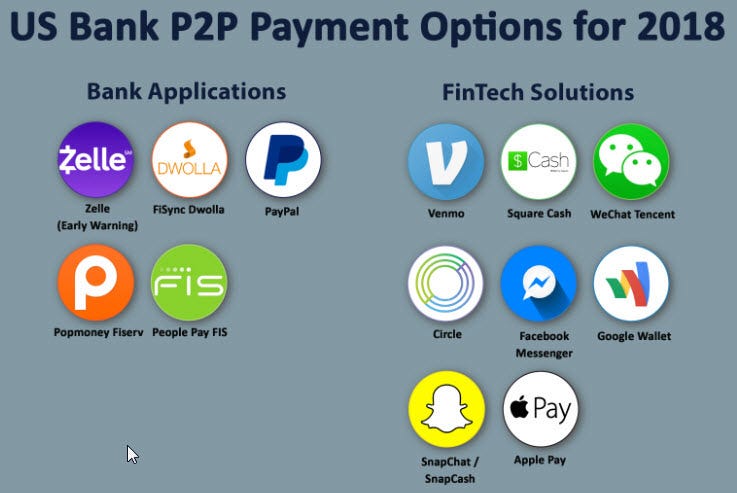 Just some of the compitors that already have more trust, scale, tech & stability
Just some of the compitors that already have more trust, scale, tech & stability
It can’t !
I’m sorry, but for the average user, the following is way more useful than BCH. It’s instant, another 2bn people have it, and most importantly it’s STABLE:
Bitcoin (nor any other blockchain for that matter) cannot, and will not win the “convenient payments” war, nor will it win the “cash replacement” war unless it survives — and the only way to do that is spread Bitcoin, like a virus, on multiple layers & make it impossible to kill.
As long as that core layer remains the source of truth, and remains incorruptible, we can build solutions on top of it which have the chance to compete with all of the above, all whilst retaining the store of value, bearer asset foundation.
Without that, we’re competing with them — and that’s a fight we’re most likely going to lose.
3. Fighting the WRONG Fight
As an extension the above, it’s important to note that this entire landscape of cryptocurrencies is partly collaborative, but from a network analysis standpoint; it’s a war.
And BCH is fighting on too many fronts, too soon:
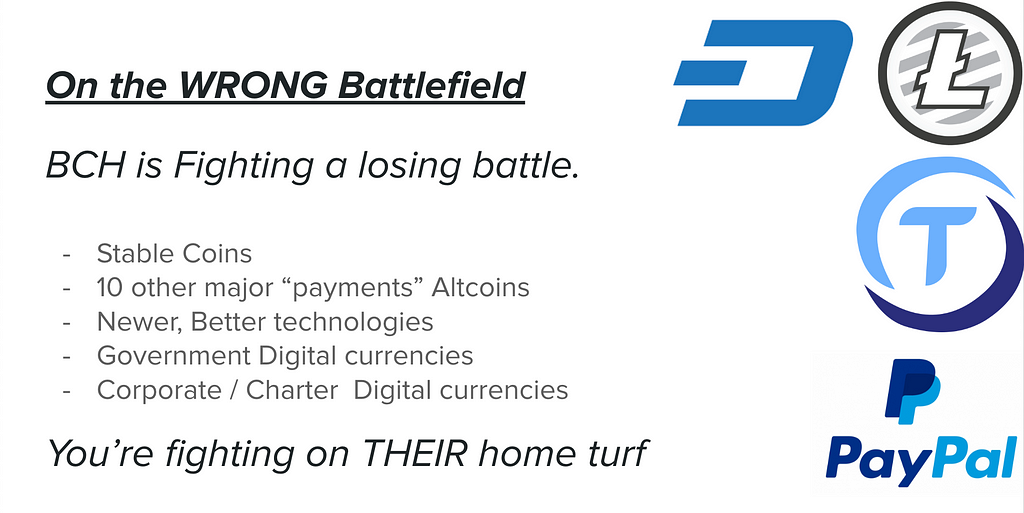 Another slide from my presentation. CBF writing it all again.
Another slide from my presentation. CBF writing it all again.
I think there are now 8 or 9 stable coin projects that are prominent, let alone another 20 or 30 which are probably in the works or on the way.
Some are more boring tokenized representations of fiat, but some like MAKR Dai and maybe even Basecoin have quite interesting models the blend elements of decentralization, stability, speed of payment & more.
Then you have Litecoin, Dash, ZCash and how many others?
When you layer those, with the Government or Central Bank issued “crypto currencies” (which is a misnomer, and is a load of shit, but will fool the general public) you have a scenario where you’re trying to say this “other” thing (BCH) is a better medium of exchange than what the UN is releasing.
hmmm.
Lets even take the government / central bank morons out of the equation.
What about Amazon / Facebook / Google / Tencent / Ali Baba or Apple releasing their own transactional currency? They already service more than half the world (if not more) and being the size they are, have gained considerable trust amongst the mass population.
 The competitive landscape, outside of just “crypto”
The competitive landscape, outside of just “crypto”
Here’s the thing. They can all make a digital currency with high transactional utility and capacity. But guess what; none of them can create a decentralized, censorship resistant bearer asset.
This is a tough fight.
3. Trustless Systems Require TRUST!
Paypal is better than BCH.
There! I said it!
- It’s Free
- It’s got WAYYYY more users
- It’s faster
- It’s more trusted, by more people.
For all the talk we have about “trustless” systems, the adoption of these new digital / crypto currencies is actually built upon a bedrock of trust.
And that “trust” comes in layers:
- Trust that the math works (engineers / experts)
- Trust that the experts and engineers know what they’re doing (reputation)
- Trust derived from the spokespeople & supporters of the protocol / project
That last piece more important than we realise.
99% of the population, (ie; the people who will drive the next wave of adoption) don’t really understand (1), may get a glimpse of (2), but will base their decisions on (3).
Adoption is a form of layered trust.
And at the moment, I can tell you for certain the following:
a) As a payments mechanism for the general public, Paypal is a better solution than BCH.
b) People will trust a public company the size of PayPal LOOOOOOONG before they’re going to trust a couple of shady miners, a dodgy website that confuses people about what their buying and a moron fake satoshi running around saying he’s “modelling things”.
4. Bitcoin Dominance
The argument about BTC Losing dominance due to block size limit is void.
The argument says that “because Bitcoin throughput was limited, all of these other cryptocurrencies had a chance to be created and gain traction and as a result have taken away from Bitcoin’s dominance”.
I call bullshit.
Altcoins and other cryptos were ALWAYS going to come along and they’re part of a cycle.This is an OPEN SOURCE technology and the entire point is that anyone can use / duplicate / modify it.
Anyone who thinks otherwise is a complete moron.
(Kyle Samani wrote a brilliant piece on the importance of go-to-market in this open source industry which drive this point home nicely).
All great technologies go through boom / bust / growth cycles.
When the internet was first taking off, there was not only multiple variations, but everyone said it was the boring version of all these new “information super highways”.
It’s been the same throughout history with ANY new technology, and in this world of open source; the effects are compounded by orders of magnitude!
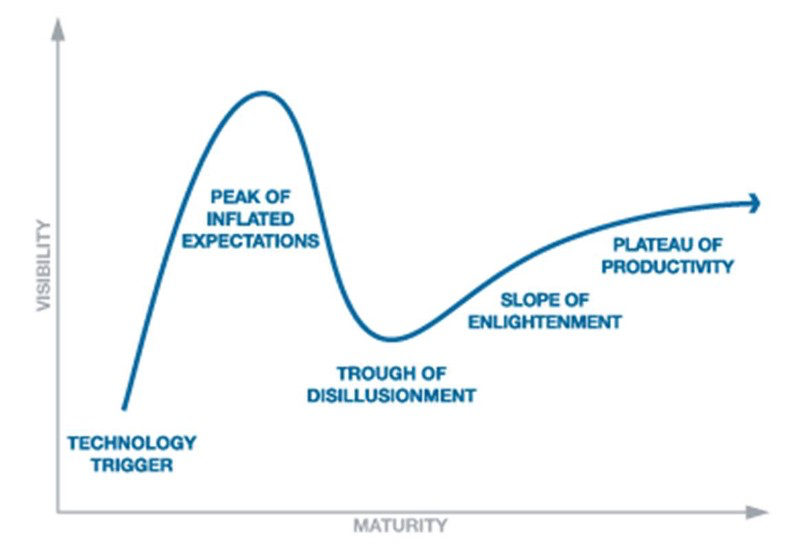 Gartner’s hype cycle. The same will happen in Crypto
Gartner’s hype cycle. The same will happen in Crypto
The fall in dominance is a natural occurrence, that’s part of a cycle.
When all of the stupid shitcoins, with no team, a shit idea and no execution experience go bust, Bitcoin’s dominance will rise again.
**Note**
I’d also say that Bitcoin’s dominance in the broader scope of the crypto market is a very BAD indicator of Bitcoin’s dominance.
If anything, Bitcoin should be measured more against other bearer asset stores of value, and less against things like XRP or ETH.
In that sense, it’s ‘dominance’ has not fallen at all. In fact, it’s probably remained extremely steady whilst the overall network value has grown.
5. “All the Volume is gone”
All the “volume” coming into BTC was not from usage — it was 85% speculation.
Trying to point at the block size as the reason why Bitcoin volume dropped is ridiculous.
The volume dropped because the bubble popped! All the morons who bought Bitcoin or any other Alt at the peak of the bubble ran for the exits as soon as that shit started to dump.
That has ZERO to with Block Size. It’s pretty simple.
6. BTC should do everything
This one is stupid.
Yes — whilst there are potentially more than one use case for public, decentralized, consensus networks (although value is the foundational one), it doesn’t mean that Bitcoin should represent them all.
BTCs focus should be on being sound money.This idea that BTC should do everything is stupid because it increases the attack surface, dilutes the message to the market, and makes it a jack of all trades & master of none.
There is more than enough space for other crypto projects to solve other use cases.
7. Fee Markets are Bad
Again, I think this is a major flaw in logic.
Markets exist within certain parameters. Parameters is another word for “constraints”, and without these, you would not have markets — you would just have noise. Or spam.
The biggest problem with the internet is that data has become negligble in cost, and as a result, we are bombarded with spam and noise. The new wave of successful internet applications are all about making “sense” of all that noise, trying to prioritize it, trying to filter it, etc.
Without going down another rabbit hole here, let me just say a fee ‘market’ is a powerful thing.
Markets are the foundation for robust ecosystems that represent actual value.
Unlimited free transactions on empty blocks is just stupid. It = spam.
And most importantly, if you take a long term view on all of this, high fees are not a problem. They only had an impact for about 2 or 3 months during a fucking tulip-style mania that saw the most avid depiction of the greater fool theory at work.
8. Store of Value Hypothesis
BCH proponents say Store of Value is either ”bullshit made up by Blockstream operatives”, or “something that comes later”.
Clearly they’re either confused, or just have no concept of human evolution, nor monetary history.
There are trillions of dollars in the world, currently being stored somewhere, not moving. That money wants safety. It wants security — and it wants enough liquidity to have some level of mobility.
It’s currently much safer to put your money in USD or Gold for that purpose.
Bitcoin has gives the world a solution that’s orders of magnitude better than both USD and Gold, and in order to keep it that way, Bitcoin needs to evolve and trend toward further decentralisation, and build layers of redundancy into the verfication, validation and participation models.
Making payments 10min faster and 15c cheaper, for a total of 3–12 months (wait until lightning gains adoption), with the trade-off of confusing the community, confusing the new users, trolling & wasting everyone’s time, hijacking a brand, and most importantly building a “solution” on an architecture that trends toward centralisation and control by a few idiots is the most short sighted, selfish, ridiculous, greedy, profoundly stupid things I have ever seen in my life.
Security / Trust is what’s needed for Store of Value. These factors always trump transactional utility. Take a moment to look through history. Gold survived as a store of value (more than anything else), whilst EVERY SINGLE currency in the histroy of humanity that focused on a “better form of transactional utility” blew up. Every one. Gold was actualy a pretty shit medium of exchange (comparitively more over the last 500–2000yrs), but it’s the only SoV that actually still exists.
Medium of Exchange does not beget Store of Value. It’s not how things work.
There is a logical order and flow. This is Bitcoin:
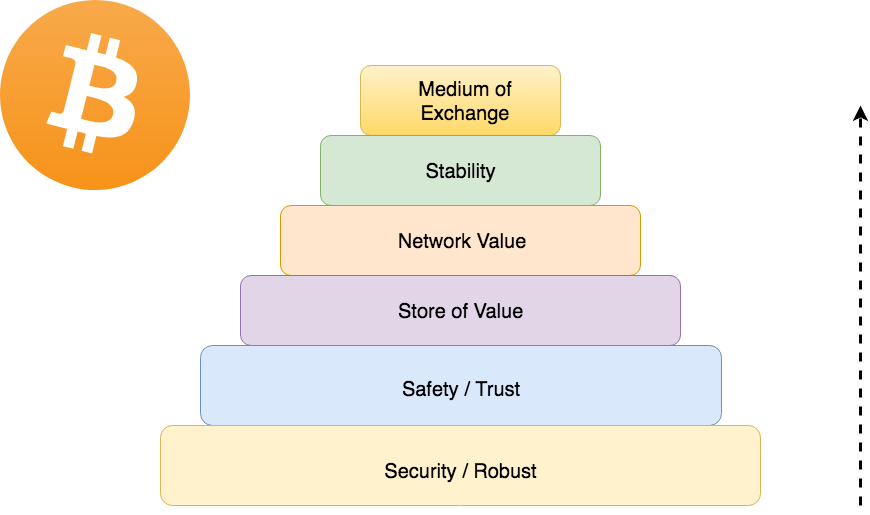 Bitcoin. Strong Foundation. Abstracts up the Pyramid of Value
Bitcoin. Strong Foundation. Abstracts up the Pyramid of Value
And this is Bitcoin Cash:
Now..you might be thinking I’m taking a stab at BCH, or that the diagram is not entirely accurate — and you’d be right.
But…I actually have no idea what they’re thinking. I’ve read so many of their arguments and (a) they’re all so contradictory, (b) they all revert back to some form of conspiracy theory.
That’s not enough to convince me…sorry.
To Be Continued…
___________________________________________________________________
I guess I’ll be splitting this into 3 parts — hopefully making it easier for you to digest.
I’ll update the links to Part 2 and Part 3 here once they’re done, otherwise just jump on my profile and find them.
I would also strongly recommend you read this article because it will give you the foundational elements you need from a historical perspective to better understand where I’m coming from:
Homo Sapiens, Evolution, Money & Bitcoin
___________________________________________________________________
About the Author
As with probably most crypto maniacs, I have something to do with a bunch of things, although my core project is working to get more people involved in this exciting new space. (Project to be formally announced soon)
I do also read…alot.
If you’d like to connect with me, I’m on LinkedIn, Twitter (which I should probably start using more), and I’d really appreciate it if you followed me here on Medium + shared this article around (some claps would be great too).
Bitcoin (BTC) / Bitcoin Cash (BCH). Part 1 was originally published in Hacker Noon on Medium, where people are continuing the conversation by highlighting and responding to this story.
Disclaimer
The views and opinions expressed in this article are solely those of the authors and do not reflect the views of Bitcoin Insider. Every investment and trading move involves risk - this is especially true for cryptocurrencies given their volatility. We strongly advise our readers to conduct their own research when making a decision.

